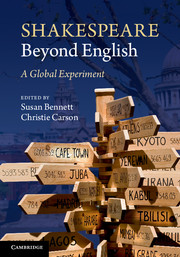Book contents
- Frontmatter
- Contents
- List of Illustrations
- List of colour plates
- Notes on contributors
- Foreword
- Acknowledgements
- Introduction
- The Globe to Globe Festival: An Introduction
- Performance Calendar
- Week One
- Week Two
- Week Three
- Week Four
- Week Five
- Chapter Twenty-Eight Bread and circuses
- Chapter Twenty-Nine ‘No words!’
- Chapter Thirty Ending Well
- Chapter Thirty-One Creative Exploitation and Talking Back
- Chapter Thirty-Two A Shrew full of laughter
- Chapter Thirty-Three Foreign Shakespeare and the Uninformed Theatre-goer
- Chapter Thirty-Four ‘Didst hear her speak? Is she shrill-tongued or low?’
- Week Six
- Afterwords
- Index
- Plate section
- References
Chapter Thirty - Ending Well
Reconciliation and remembrance in Arpana's All's Well That Ends Well
Published online by Cambridge University Press: 05 June 2014
- Frontmatter
- Contents
- List of Illustrations
- List of colour plates
- Notes on contributors
- Foreword
- Acknowledgements
- Introduction
- The Globe to Globe Festival: An Introduction
- Performance Calendar
- Week One
- Week Two
- Week Three
- Week Four
- Week Five
- Chapter Twenty-Eight Bread and circuses
- Chapter Twenty-Nine ‘No words!’
- Chapter Thirty Ending Well
- Chapter Thirty-One Creative Exploitation and Talking Back
- Chapter Thirty-Two A Shrew full of laughter
- Chapter Thirty-Three Foreign Shakespeare and the Uninformed Theatre-goer
- Chapter Thirty-Four ‘Didst hear her speak? Is she shrill-tongued or low?’
- Week Six
- Afterwords
- Index
- Plate section
- References
Summary
Shakespeare's history on the Indian subcontinent is one of the ambiguous legacies of the country's colonial history. The late nineteenth and early twentieth centuries saw what Sukanta Chaudhuri refers to as the ‘Indian Renaissance’, during which ‘Shakespeare provided the biggest single channel for not only literary or artistic innovations but the underlying transformation of values’. From 1855, Shakespeare formed a core part of British recruitment for the Indian civil service, embedding the works into institutional discourse at the highest levels. Since independence, however, the balance of the country's relationship with Shakespeare has shifted from the theatre into the study, becoming ‘merely an occasional contributor to a theatrical agenda shaped by other themes, techniques and concerns’.
Arpana Theatre's repertoire, typical of the modern Indian theatre, focuses primarily on contemporary Indian playwrights interspersed with a selection of modern and classical European dramas. In presenting the company's first take on Shakespeare, it is perhaps telling that Sunil Shanbag's production was set at the turn of the nineteenth century, evoking simultaneously Shakespeare's heyday in Indian culture and a period of ambivalence towards the cultural hegemony and control enjoyed by Britain. The setting was, perhaps, a light way of acknowledging the complex relationship of this non-Shakespearean company to the playhouse and festival within which its All's Well That Ends Well received its London performances; the joyous celebration of the invitation to participate and be invited onto the Globe stage was tempered by gentle jokes at the expense of British cultural dominance. Arpana's careful balance allowed the production to act simultaneously as a reaffirmation of the country's love for Shakespeare and an assertion of the company's own artistic and creative independence.
- Type
- Chapter
- Information
- Shakespeare beyond EnglishA Global Experiment, pp. 237 - 240Publisher: Cambridge University PressPrint publication year: 2013



